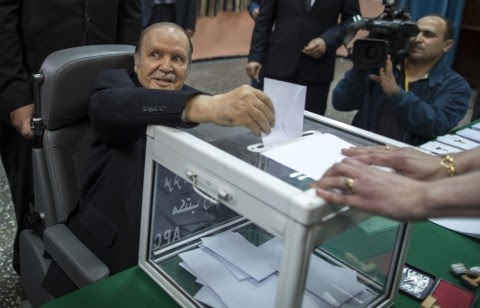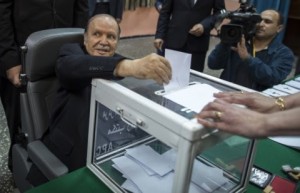The Washington Post
By John P. Entelis
Algeria’s President Abdelaziz Bouteflika casts his ballot during the presidential election in Algiers on April 17, 2014. (Zohra Bensemra/Reuters)
The Arab Spring came and went with little notice in Algeria. To be sure, all the conditions extant in those Arab countries that underwent violence-induced regime change – political oppression, social alienation, economic marginalization, cultural disillusionment – were equally present in Algeria. These accumulated
grievances found expression in nationwide protests and large-scale mobilization of cross sections of Algerian social groups. Yet each and every one of the civil uprisings were effectively contained through a combination of coercive force and sociopolitical incentives intended to pacify immediate demands.
Among the regime’s promises made at the time were reform of the political system through significant constitutional changes intended to democratize politics, enhanced transparency and institutionalized rule of law. It was assumed that such constitutional engineering would simultaneously resolve economic, social, cultural and political grievances. Given the opaque nature of Algerian politics, it was no surprise that it took nearly five years before a draft of an amended constitution was made public. It is now ready for parliamentary approval with implementation scheduled for early 2016.
A close reading of this document and a review of the contested politics surrounding its composition, consultation and content suggest that the amended constitution neither promotes the rule of law nor codifies basic democratic principles. Rather, it serves to reinforce the authority of the state at the expense of civil society. Constitutional engineering in Algeria is but another instrument by which an embedded military-industrial complex constructs a legal scaffold to maintain and perpetuate the authority of the state.
Limited consultation among the regime elite
From the outset, the top-down process of constitutional engineering was conceived, constructed and communicated by a small group of regime elites with President Abdelaziz Bouteflika at its head. With little input from civil society, Bouteflika’s constitutional committee single-handedly defined what it believed was necessary to articulate a putatively democratic document without fundamentally altering the balance of power.
Formal approval is in the hands of the rubber stamp parliament instead of a national referendum as has often been used for previous instances in which the government has sought a popular mandate for controversial initiatives like Bouteflika’s 2006 “Charter for Peace and National Reconciliation” that provided blanket amnesty for those involved in human rights violations during the country’s 1992 to 2000 bloody civil war.
The independent print media has been particularly critical of the cabal nature of the consultation and decision-making processes involving high level government officials tasked with formally approving the amended constitution. Particularly galling has been the direct participation of Gen. Ahmed Gaid Salah, the army chief of staff and vice minister of defense, in the deliberations. Gaid Salah is among Bouteflika’s “power brokers” who unilaterally decided to certify the amended constitution in a meeting on Dec. 14, 2015. This same group — which included Bouteflika, Gaid Salah, Minister of State and presidential counselor Ahmed Ouyahia, Prime Minister Abdelmalek Sellal, Minister of Justice Tayeb Louh, Vice Minister for National Defense Tayeb Belaiz, and presidential adviser Boualem Bessaïeh — will most likely also be the body that determines the presidential succession as Bouteflika’s precarious health makes it unlikely that he will serve out his fourth term to completion in 2019.
What’s new, what’s not
The new constitution has added numerous amendments, many procedural in nature and others directed at enhancing economic efficiency and transparency. The most “radical” changes, or the lack of changes, are political in nature even if presented as culturally and linguistically inspired. Almost all respond directly to what the government perceived as the principle motivations for the Arab Spring protests.
These proposed amendments include: the recognition of Tamazight as a national and official language along with Arabic and the creation of an Algerian Academy of Berber Language tasked with consolidating its new status as an official language; employment equality for women and men; recognition of youth as a dynamic force in the country’s development; freedom to demonstrate peacefully and freedom of the press; only single Algerian nationality qualifies a citizen for public or political positions; dual nationality is no longer recognized in such instances (Art. 51); two-term limit for the presidency of five years each; presidential nomination of a prime minister from the majority party in parliament and of cabinet members after consulting with the prime minister; and the establishment of an independent electoral commission (Haute Instance Indépendante de Surveillance des Elections) to monitor all elections in a transparent and impartial manner.
While there has been much debate about creating the post of vice president given the president’s uncertain health, no such position has been included in the new constitution.
Each of these newly inscribed constitutional rights is directed at assuaging the discontent so evident among Berbers, women, youth, civil society activists and political opponents, who have long felt that basic democratic freedoms and opportunities have been denied to ordinary Algerian citizens. Yet given the way this document has been conceived, communicated and constructed, almost all of the discontented groups remain unconvinced that the rhetoric of the state, now imbued in an amended constitution, will in fact be translated into political action.
Contentious politics
Discontent and skepticism about the constitutional promises emerged almost immediately after they were announced in the aftermath of the Arab Spring. Criticism was directed at the excessive duration of the deliberations, with the full text of the document only appearing in late 2015 and the absence of a truly open debate process as the nearly five years of preparatory discussions occurred behind closed doors. Once made public, criticism shifted to the document’s content itself. While the official media praised its “democratic” character, the new constitution received criticisms from a broad range of ideological orientations, including Louisa Hanoune on the extreme left, Ali Benflis a perennial presidential contender and former prime minister, and Ali Fawzi Rebaïne’s AH54, a minor movement of political opposition. Even Amar Saadani, secretary general of the ruling FLN party of which Bouteflika is head, has taken issue with article 51, which disqualifies dual citizens from public positions, as have all overseas Algerians living in France, Canada and elsewhere.
Democratic transition on hold
The new constitution’s preamble identifies a series of principles that are immune to further amending or changes including the country’s Arabic, Muslim, republican and democratic character. To these “unchanging” principles, the proposed amendments have now added a two-term limit for the president. Unless you’re an incorrigible gambler, you would not bet against future amendments to this two-term limit principle given the multiple iterations of the Algerian constitution since 1963. Amended versions came out in 1976, 1986, 1989, 1996, 2008 and 2016, so it’s unlikely this most recent iteration will be the last.
Key questions remain. Given the current political, security and socioeconomic crises facing the country, does the regime still have the capacity to co-opt opposition and buy social peace in the manner and style once considered “routine” for regime elites? Does the latest iteration of constitutional engineering substitute for previous co-opting strategies or simply represent a continuation of past practices? Is the pressure for fundamental institutional reform from high-profile individuals sufficiently comprehensive and sustained to transition Algeria from its current “competitive authoritarian” mode of governance to a genuine democracy? Finally, does the demilitarization of the Algerian polity now underway serve as a fundamental precondition for the advent of law-bound government, or is civilian rule as devoid of democratic propensities as its military counterpart?
A glance at one measure of law-bound government, Bouteflika’s one-sided electoral victories — winning by 73.79 percent in 1999, 85 percent in 2004, 90.24 percent in 2009, and 81.53 percent in 2014 — suggests competitive authoritarianism in Algeria remains alive and well. Such “victories” also reaffirm the general distrust shared by masses and elites toward constitutional engineering as an instrument of democratic legitimacy.
While Algeria may have escaped the worst excesses of the Arab uprisings, the multiple challenges that it has confronted in the past five years since those events remain unchanged. Indeed, given the drastic reduction in hydrocarbon-generated revenues, the regime will have difficulty sustaining both its coercive mode of societal control and its strategy of buying off opposition through rapid infusion of public spending on basic goods and services including raising salaries of state employees and expanding public housing construction. The ongoing civilian-military struggle over who will control the upcoming presidential succession further fuels the uncertainty surrounding Algeria’s ability to maintain its outlier status as a stable, secure and successful polity amidst the revolutionary violence that surrounds it.
John P. Entelis is a professor of political science and associate director of the Middle East Studies Program at Fordham University. He has authored and co-authored numerous books, articles in scholarly journals, chapters and analytical works on the comparative politics of the Middle East and North Africa.
This piece is part of a series of reflections on the Arab uprisings after five years.








